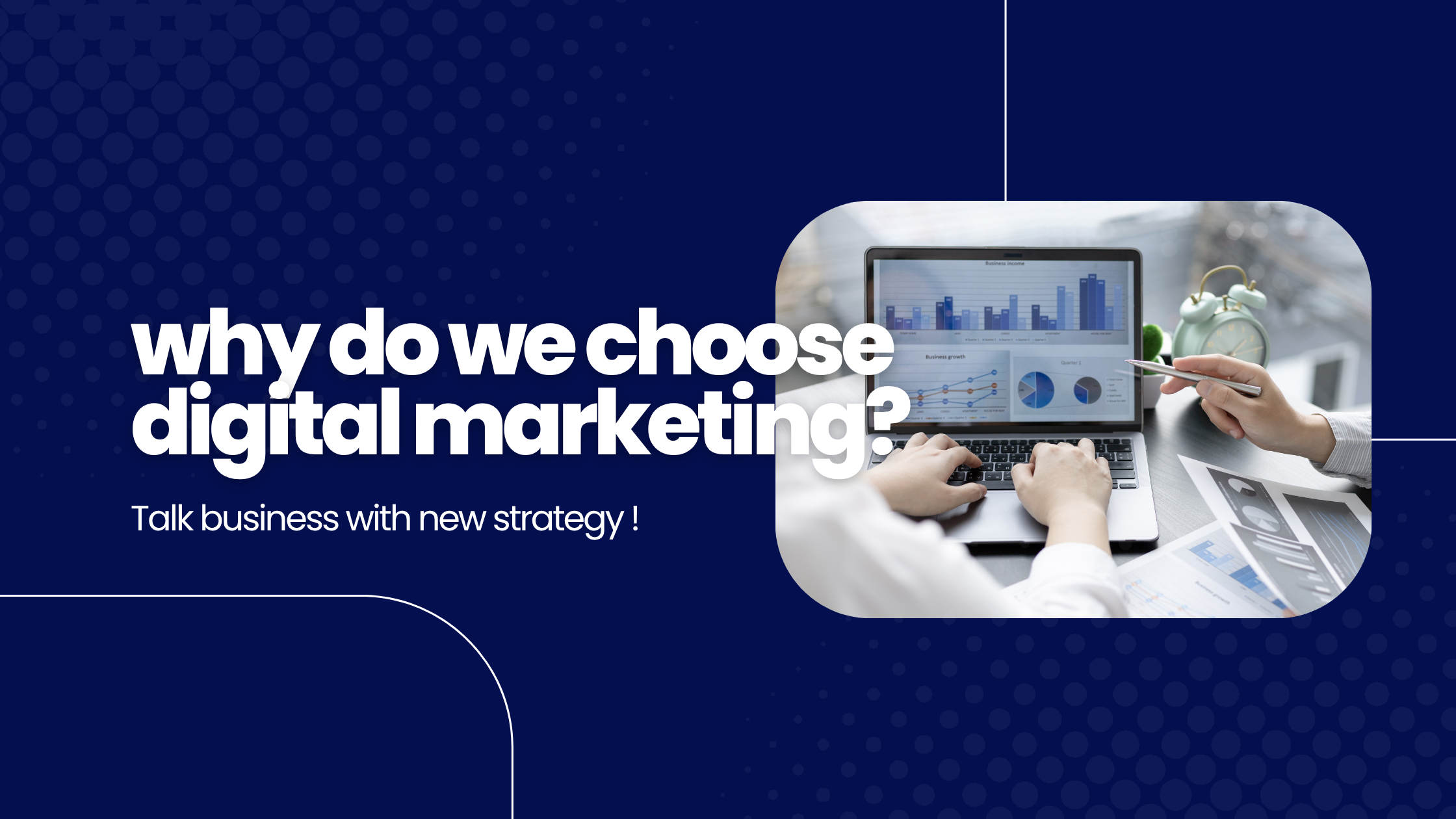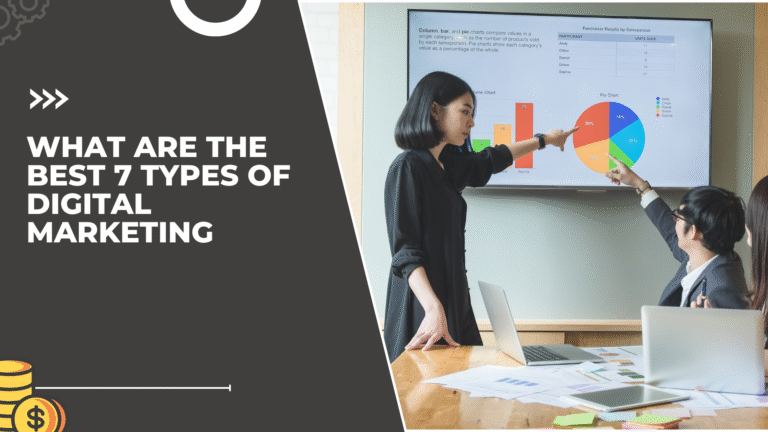Why should we choose the best digital marketing?

In today’s digital-first world, businesses cannot ignore the power of online platforms like digital marketing, which is one of them. Whether you are a startup, a small local business, or a large enterprise, digital marketing is no longer optional—this is necessary. The change of market through the Internet has changed how brands interact with consumers and how businesses grow and thrive.
But why do we choose digital marketing over traditional forms of marketing? What makes this such a powerful device? Let’s find out the major reasons that make digital marketing a favorite strategy in the modern trade scenario.
1. Comprehensive access and global audience
The biggest reason for digital marketing is its global access. Traditional marketing methods – such as newspaper advertising, hoardings, or television – are often limited by geography and cost. In contrast, digital marketing allows businesses to reach anywhere in the world with a few clicks.
Whether it is through social media, Google advertising, email campaign, or material marketing, providing endless possibilities to connect with diverse audiences on digital platform boundaries. This makes digital marketing particularly valuable for businesses that expand worldwide or target top audiences.
2. Cost-Effective Compared to Traditional Marketing
Digital marketing is more affordable than traditional marketing methods. Running ads on television, printing flyers, or purchasing billboard space can be extremely expensive, especially for small businesses with limited budgets.
With digital marketing, you can start running a Facebook or Instagram advertising campaign for a few hundred rupees – and the results scale up. Tools such as Google Adwords, Facebook Advertising, and SEOs allow you to control your budget, prevent or adjust campaigns, and maximize returns on investment.
Why The cost-effectiveness is that startups and SMEs often prefer digital marketing on traditional marketing.
3. Average status result and analysis
In traditional marketing, it is difficult to track the success of a campaign. You can advertise in a newspaper, but you will rarely know how many people really saw or acted. This is the place where digital marketing is Excel.
With devices like Google Analytics, Facebook Insights, and Email Tracking Software, you can see real-time results, such as:
How many people saw your advertisement
How many clicks were made on your website
Which place or device did they come from
What action did they take (purchase, form submission, etc)
This ability to track performance helps marketers to optimize campaigns, reduce wasteful spending, and make data-driven decisions.
4. Targeted digital Marketing
Digital marketing gives businesses the ability to target very specific groups of people. Whether it’s by age, gender, location, interests, online behavior, or buying history, you can tailor your marketing efforts to reach exactly the people you want.
For example:
A fashion brand can target users interested in streetwear aged 18–25 in metro cities.
A digital course provider can target working professionals looking to upskill in digital marketing.
This precision targeting ensures better engagement and higher conversion rates.
5. Engagement and Interaction with Audience through digital marketing
Unlike traditional marketing, which is mostly one-way communication, digital marketing allows for two-way interaction between brands and customers. Social media platforms, for instance, enable businesses to engage directly with their audience through:
Comments and replies
Polls and quizzes
Live sessions and webinars
User-generated content
This direct engagement builds trust, encourages feedback, and improves customer satisfaction. It helps businesses stay connected with their community in real-time.
6. Higher Conversion Rates
With digital marketing, users can take immediate action. Whether it’s signing up for a newsletter, buying a product, or booking a service—every step can be tracked and optimized.
Landing pages, call-to-action buttons, remarketing ads, and email follow-ups all play a role in improving conversion rates.
In fact, with the right funnel and messaging, digital campaigns can deliver much better ROI than traditional advertising efforts.
7. Mobile-Friendly Marketing
More than half of the global internet traffic now comes from mobile devices. This shift has made it essential for businesses to reach users on smartphones and tablets. Digital marketing is inherently mobile-optimized:
Social media apps
Mobile-friendly websites
SMS marketing
WhatsApp promotions
Location-based targeting
These allow businesses to stay in touch with consumers on the go, making digital marketing a highly relevant strategy in today’s mobile era.
8. Builds Brand Reputation and Online Presence
In the digital age, a brand’s online reputation is everything. From Google reviews to social media mentions, your online presence can make or break your credibility.
Digital marketing helps you control and manage your brand image by:
Sharing valuable content
Encouraging positive reviews
Engaging with customers online
Handling complaints swiftly
Showcasing testimonials
A well-managed digital presence builds trust and authority, which can drive long-term customer loyalty.
9. Flexibility and Real-Time Updates
One of the biggest benefits of its flexibility. Unlike traditional campaigns that require long planning and cannot be changed once launched, digital marketing campaigns can be adjusted in real time.
You can:
Pause or stop an underperforming ad
Change your target audience mid-campaign
A/B test two different messages
Respond to real-time trends
This flexibility makes digital marketing agile and adaptive, helping businesses stay ahead of the curve.
10. Supports All Stages of the Buyer Journey
From awareness to consideration, and finally to purchase, it supports every stage of the buyer’s journey. It provides content and communication tailored to:
Educate new prospects (blogs, infographics)
Nurture leads (emails, case studies)
Convert buyers (discount offers, reviews)
Retain customers (loyalty programs, remarketing)
This end-to-end support creates a seamless customer experience and drives long-term growth.
Conclusion: The Future is Digital
Digital marketing is not just a trend—it’s the future of marketing. As consumers continue to spend more time online and technologies evolve, businesses must adapt or risk falling behind.
From reaching a global audience to analyzing data and building strong customer relationships, digital marketing offers endless opportunities for innovation and growth. Whether you’re a solopreneur, a freelancer, or a multinational brand, embracing digital marketing is the smartest decision you can make today.

